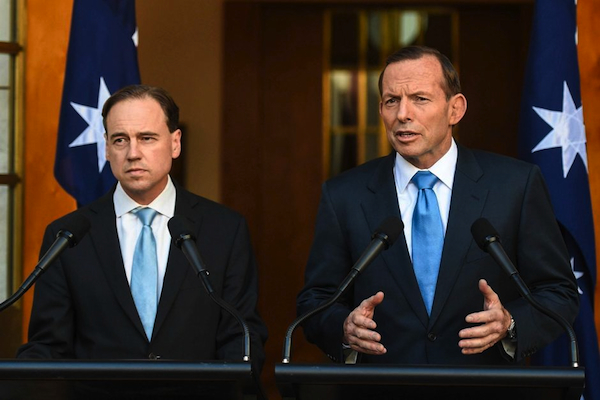Never do this again. That’s the main lesson from the Abbott experiment. [10 November 2015 | Peter Boyer]
We like to think we’re sceptical of our political masters, but a CSIRO study of Australians’ attitude to climate change says otherwise. In fact, we come across as a country of suckers.

Environment minister Greg Hunt and his former PM: Tony Abbott thought climate policy was for lesser mortals. PHOTO ABC
The five-year study, distilled in a report released last week, covered the full period of the Gillard government and ended around the time Tony Abbott’s government abolished carbon pricing.
In 2010, just over half the population thought climate change was human-induced and 40 per cent thought it was happening naturally. Four years on, less than 46 per cent thought humans caused climate change while those thinking it was natural, at 38.6 per cent, had barely changed.
In that final year of the survey, the authoritative Intergovernmental Panel on Climate Change published its most comprehensive report yet, a vast amount of incontrovertible evidence that human-induced global warming was proceeding apace and we were losing the battle to stop it.
For years Tony Abbott told a different story: that the climate battle was irrelevant, that carbon pricing was bad, that renewable energy blighted the landscape and threatened our health, that our economic future lay with King Coal.
And we believed him – enough at least to elect an Abbott government. So did his parliamentary colleagues until other factors, like dismal opinion polls, forced them to abandon him for Malcolm Turnbull, a man known to acknowledge the truth of the science.
Turnbull’s reluctance to make substantive climate policy changes reflects how deeply the Tony Abbott mindset is embedded in Coalition thinking. But he must eventually do so if he wants to rebuild Australia’s damaged international reputation.
In 2011 we were firmly ensconced in the global leadership group, courtesy of a suite of legislated measures to limit fossil fuel use and carbon pollution, support a growing renewable energy sector and encourage more carbon-friendly land management.
After we became the first and only country in the world to end carbon pricing in 2014, renewable investment dried up in the face of concerted attacks from key government quarters. In a remarkable, sustained act of political theatre, environment minister Greg Hunt represented all this as progress.
Ignorance of climate is a feature of another parallel universe, the Trans-Pacific Partnership, in which Australia (led by trade minister Andrew Robb) and 11 other countries negotiated a long-term Pacific-rim pact which makes not a single mention of climate change.
Irony of ironies: as the TPP mutual admiration society stretched hands (so to speak) across the great ocean, right under their noses Pacific islanders were losing their homelands to saltwater inundation. Climate change? Not in our back yards!
Fortunately not everyone is going backwards. Francesco Starace, CEO of the Italian energy giant Enel, observed last month that economics and technology have already closed the door on high-carbon energy. Reflecting this, the Australian renewables sector is rebounding.
Declining energy use and the steady shift to cleaner energy are making it easier for Australia to meet emissions targets. It’s almost irrelevant that the Emissions Reduction Fund is a budgetary dead weight that uses an unaccountable tendering process and lacks adequate pollution penalties.
Almost irrelevant, but not quite. It matters that ineffectual measures and unambitious goals put Australia among also-rans at the Paris climate summit. Turnbull will be there and doubtless will want to be listened to, but he carries too much lead in the saddlebags to have much influence.
Throughout his six years as party leader, backed by other radical ideologues in the Coalition, Abbott consistently misrepresented climate change science as an imaginary problem for lesser mortals to agonise over while real men got on with running the country.
He rejected the unanimous advice of CSIRO, the chief scientist, the universities and the Australian Academy of Science about the perilous reality of human-induced warming, while encouraging one or two retired or sidelined scientists to infiltrate government ranks with alternative views.
Such hairy-chested individualism might look good on a bicycle, but in charge of the country it’s downright dangerous, and its missteps will cost us for some time yet. When we’ve learned what we can from those wasted years, we should put the Abbott era behind us for good.
